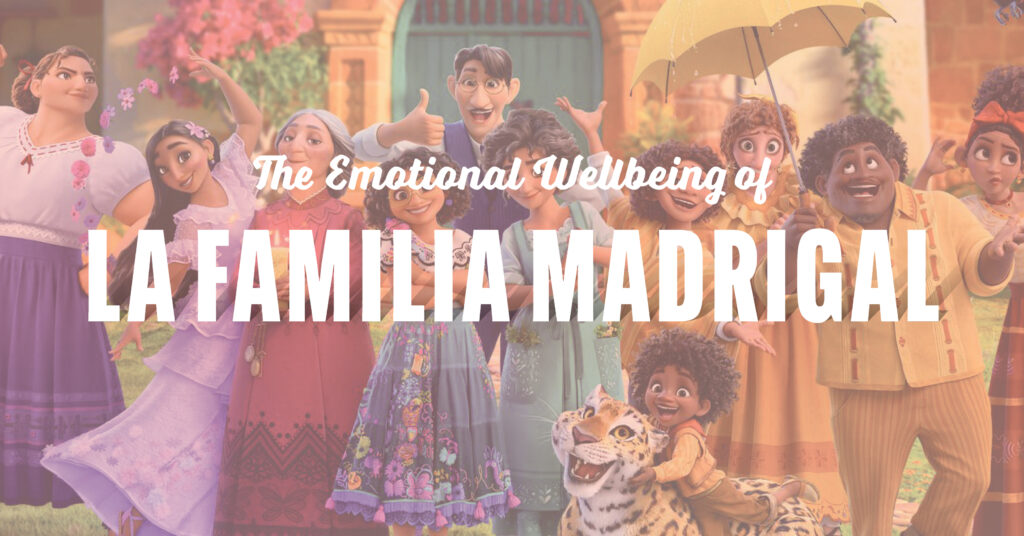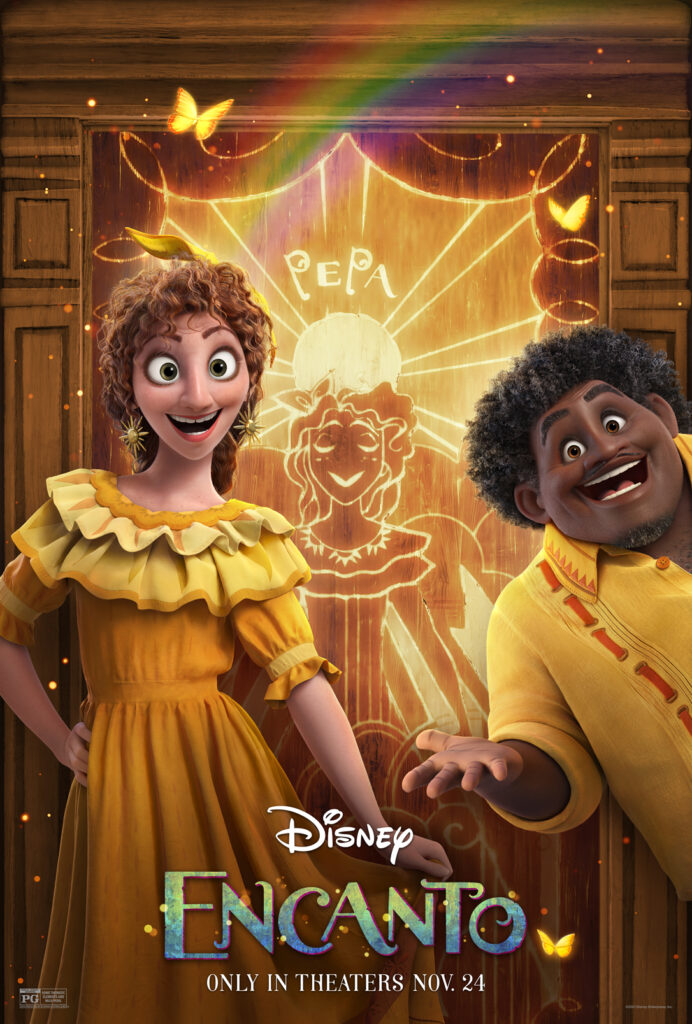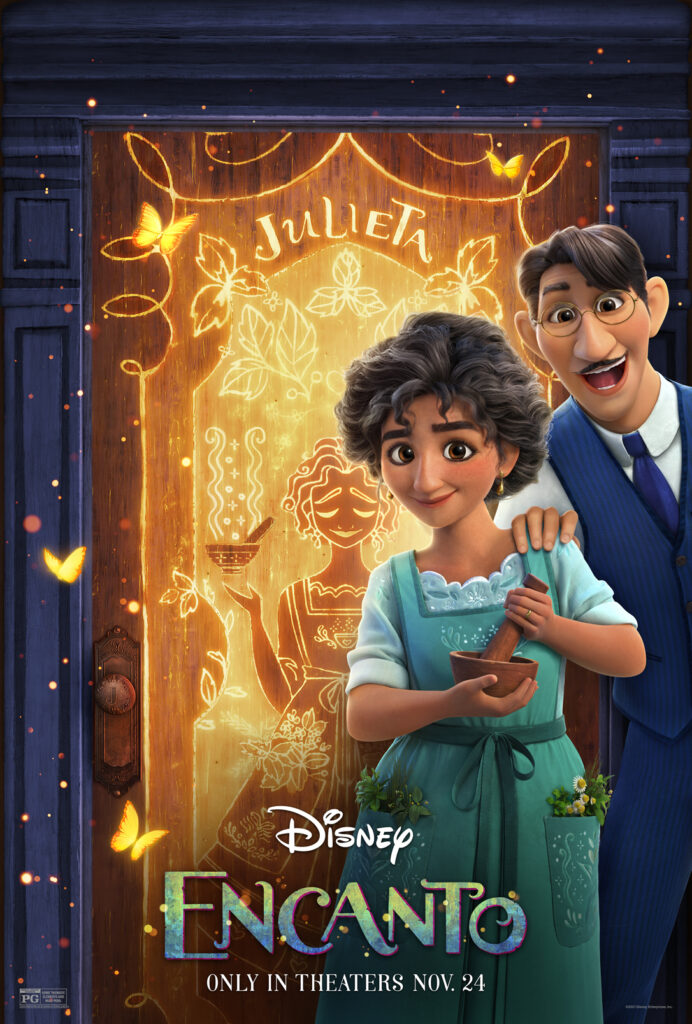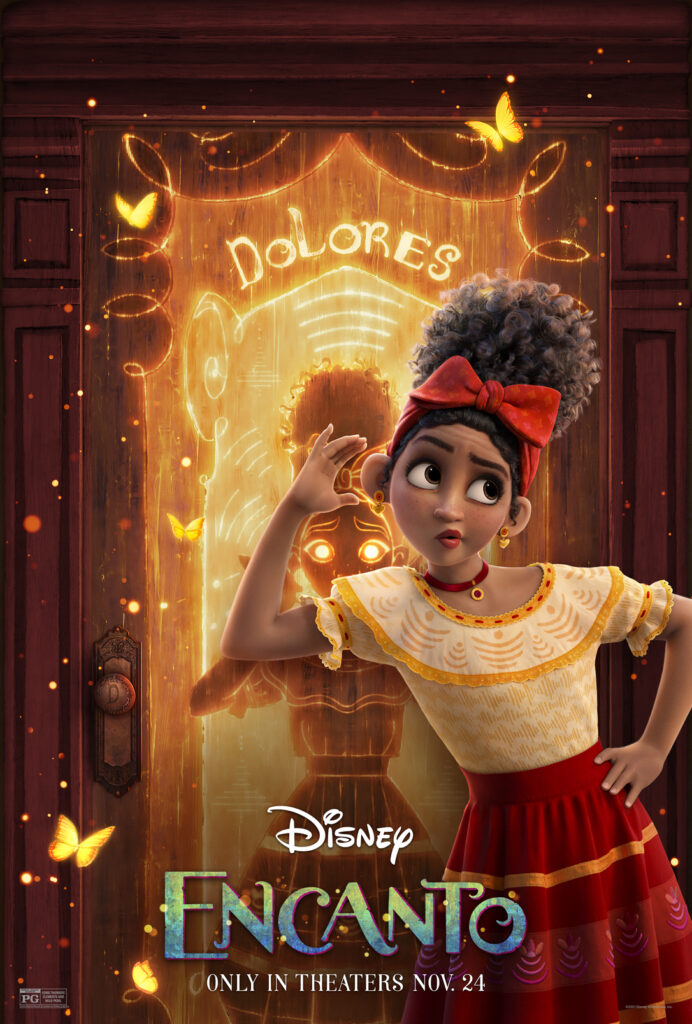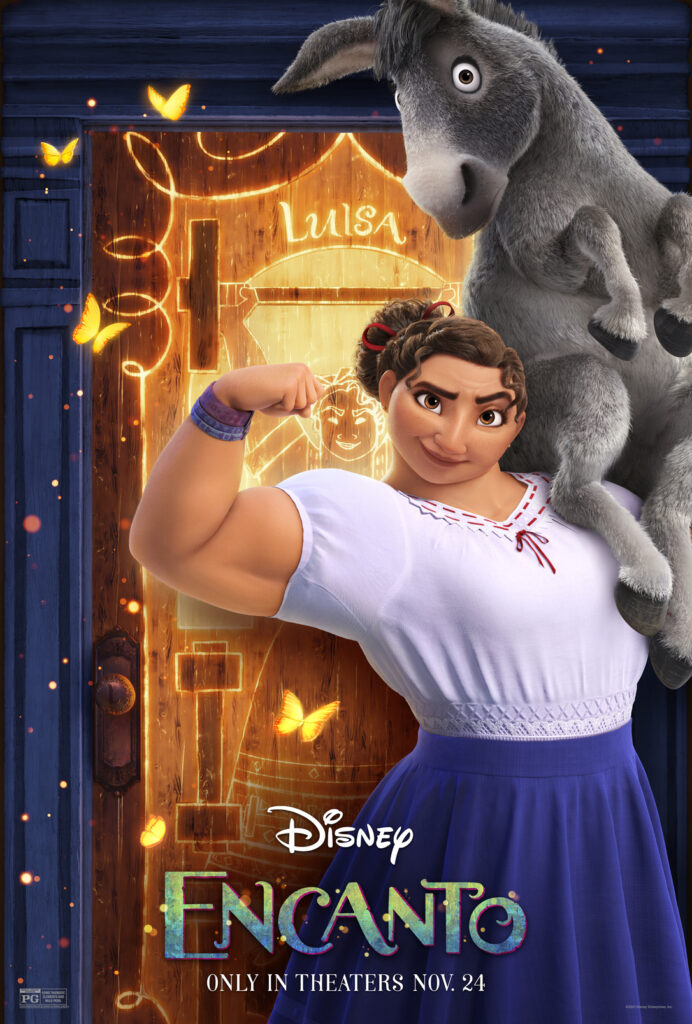I’m not a psychologist, but I’m very curious to know how one would analyze the characters of Encanto, Disney’s latest animated feature with a story that celebrates the depth of our personalities and the complexities of the human experience. I recently reviewed the movie Encanto, and why I feel it’s underlying message is so important. I refrained from getting too in the weeds in that post, but I thought I could share a little more about my reactions and thoughts for each of the characters. It may just be that my attention is hyper-focused an locked-on to anything remotely related to mental health, but I truly believe nearly every member of the Madrigal family has a powerful story to share about wellbeing, connection, and acceptance.
If you’ve seen the film but not given it much thought, prepare to have your mind blown. I’ve spent an embarrassing amount of time reading probably a little too much into it. But I think I’m onto something here…
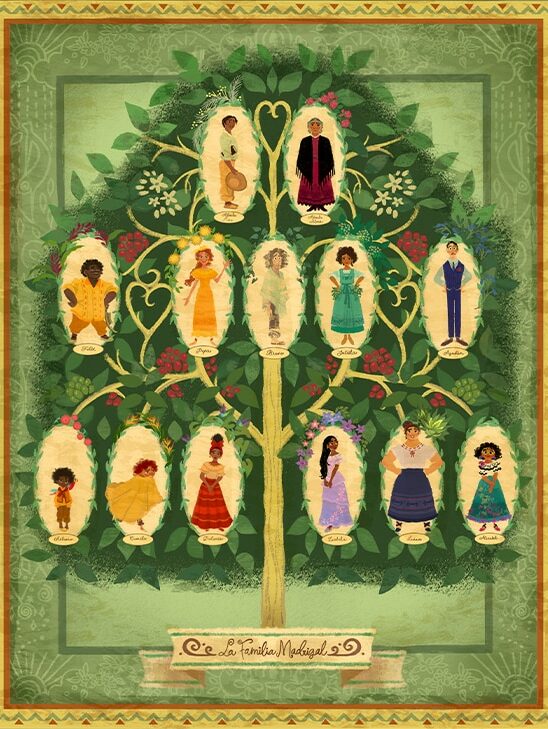
As we follow the story of young Mirabel Madrigal, we learn that she is the only member of her family who was not blessed with a special gift. Early in the film, however, we begin to get the impression that things are not always as they first appear, and the Madrigal family members’ blessings often seem more like burdens.
NOTE: ***SPOILERS BEYOND THIS POINT***
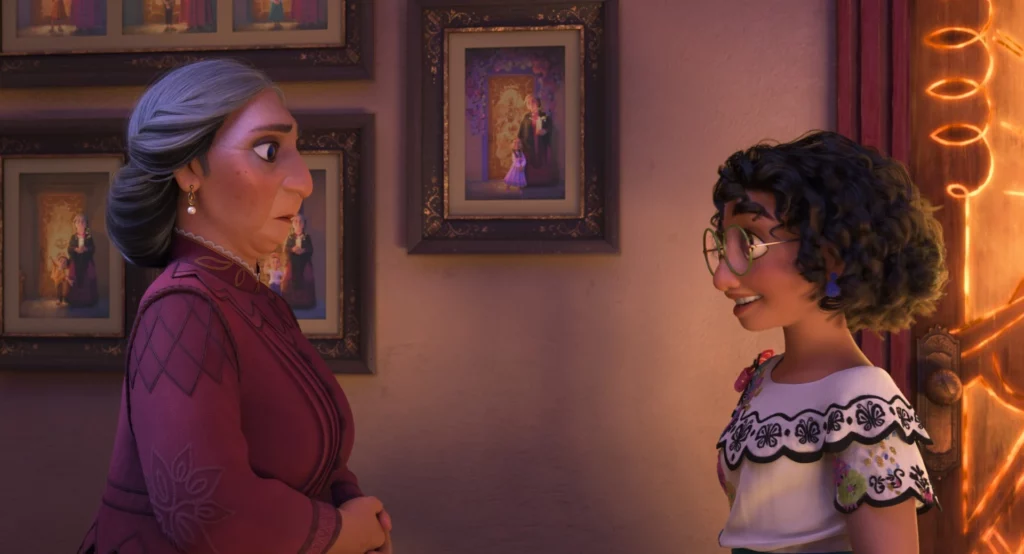
Abuela
“Let’s be clear, Abuela runs this show.”
Abuela Alma is the Madrigal Family matriarch. If not for Abuela’s sacrifices, there would be no Encanto. She brought her community to safety and the Encanto to her family, but only after enduring the unfathomably tragic experience of witnessing the murder of her love (in this way, the film stays true to a classic Disney trope of murdered parents—womp womp). Holding their infant triplets, Alma looked on from the far riverbank as Abuelo Pedro sacrificed himself to the approaching crusaders. She was overcome by the loss of her husband. In that moment, the miracle possessed the candle she held as terrain shifted around her, keeping Alma and her community hidden in the mountains of Colombia.
Over time, community members came to rely upon the Madrigals, and Abuela Alma feels a responsibility to the town—a responsibility she imposes on her family. “Our greatest honor is serving our beloved community,” Abuela says at a gift ceremony. When Mirabel senses a threat to the magic, Abuela reassures the community that the Madrigal family’s magic is strong, but secretly remarks, “if only our family knew how vulnerable we really are.”
Understandably, Abuela Alma is protective of the miracle, but she becomes blind to the fact that her desire for control is ultimately what weakens the magic and contributes to the literal crumbling of their family home’s foundation. The distress from her experience 50 years ago has persisted and become toxic to the family. Abuela’s fears of not being good enough, of losing her home (again), have hardened her, and festered into a gnarly generational trauma that’s passed down to her children and grandchildren (we see this especially in Mirabel’s need to make her family proud and in the pressure to be perfect and useful felt by her sisters Isabela and Luisa). The trauma and stress associated with the miracle manifests in different ways for the members of the Madrigal family. Generally, all their struggles can be traced back to this trauma in some way.
As a metaphor, the mountains that grow up around Abuela Alma could be seen as exaggerated emotional walls, protecting herself from further pain. Thankfully, Mirabel *can* move mountains, and breaks open that impenetrable border as she confronts Abuela, helping her to finally reckon with her past.
One other little detail which I appreciated is the selection of the Madrigal family name, which manages to capture Abuela Alma, Abuelo Pedro, and the miracle—all in one. The etymology of the Madrigal family name stems from the Latin matricale, “an adjective derivative of matrix ‘womb’, ‘river bed’.” Together, this imagery embodies both Abuela Alma (as the matriarch and womb from which the family has grown) and Abuelo Pedro (who sacrificed himself at the riverbed, at which point the family was first given the miracle).

Casita
It should come as no surprise that Hello Happy Design would dive into the family’s environs, their home: Casita. On the night that the Madrigal family was given its miracle, Casita rose from the ground before the town’s eyes. The house is anthropomorphized and becomes a vessel for the family members and their gifts, all while taking on a personality of its own. While Casita plays a charming role throughout the film, it’s most intriguing how Casita complements Mirabel, the only member of the Madrigal family who was never given a “gift”.
Moreso than any other family member, Mirabel was the most connected to the spirit of their home—and Casita seemed equally bonded with Mirabel. When the family’s miracle was directly threatened, and the home’s foundation was fracturing and crumbling, many of the family members dashed to save the candle which held the family’s miracle, but were all failed by their gifts. Only Mirabel, aided by Casita, was able to reach the candle. As testament to their bond, when the walls began to crumble, Casita gave the last bit of its energy to protect Mirabel from falling debris.
When the original house is destroyed, the Madrigals, with support from the whole town, rebuilt Casita. As Mirabel opened the door, Casita regained its magic. We are reminded that the spirit of a place comes not from its design or construction alone; rather, places are given life when we are ourselves invested in them.
Tia Pepa (and Félix)
Tia Pepa has the ability to manipulate the weather with her emotions. Though we see a rainbow overhead a few times, more often than not, Pepa is depicted walking around under a literal rain cloud. Unable to hide what she’s feeling, Pepa is described as overly emotional, while her displays of distress are typically met by her family members with annoyance and frustration, rather compassion. As someone who has struggled with depression, I couldn’t help but sympathize with her reactions every time another character told her calm down.
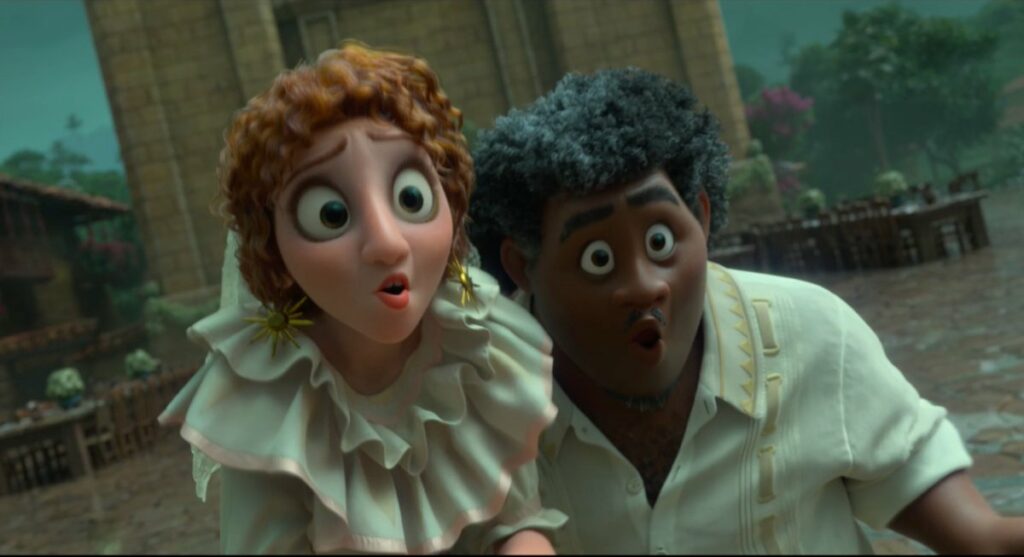
The one exception is Pepa’s husband, Félix, who is such a lovely character. He is accepting of Pepa, regardless of her mood, and able to reflect on challenges of the family history (e.g., how Tio Bruno may have been “to blame” for getting married in a hurricane) while still celebrating and holding space for the joys. I look at him and think of how he’s such an wonderful example of the sort of compassion that psychologists call “unconditional positive regard.”
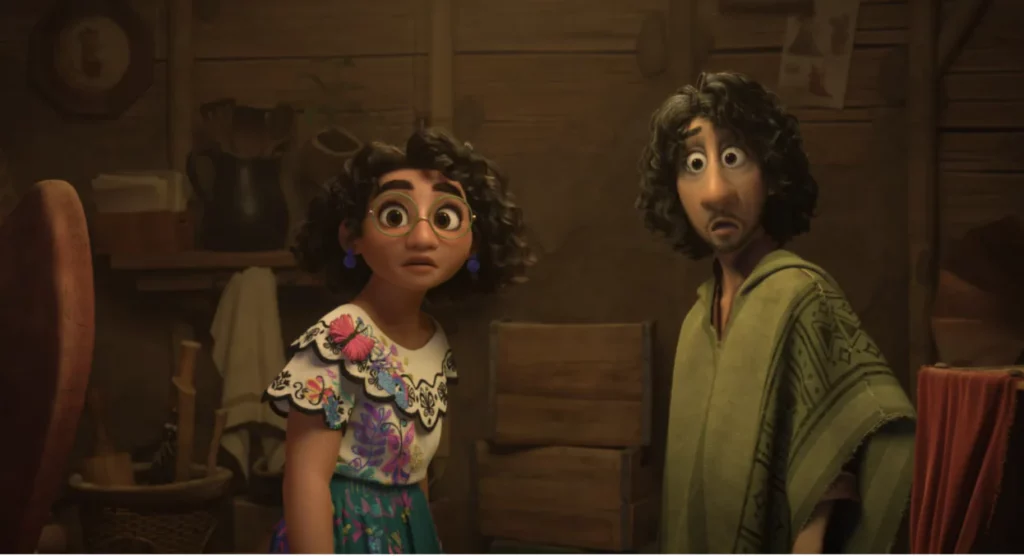
Tio Bruno
Let’s talk about Bruno, the prophetic uncle whose gift only ever seemed to be met with disappointment. Tio Bruno disappeared the night of Mirabel’s gift ceremony, which we later learn was to protect her and the family from his final vision. As the “black sheep” of the Madrigal family, Bruno felt misunderstood. Everyone insisted that he show them their own futures, but were simply unable see Bruno, the person before them. Bruno felt alone and isolated among his family, whom he loved dearly. He was made to feel as though his gift was a nuisance, but Bruno was only ever trying to protect them (which he continued by patching cracks in the casita while he hid behind the walls). As a side note, I found Bruno’s many “eccentric tendencies” and superstitious ticks interesting, perhaps even indicating that he is a neurodiverse individual.
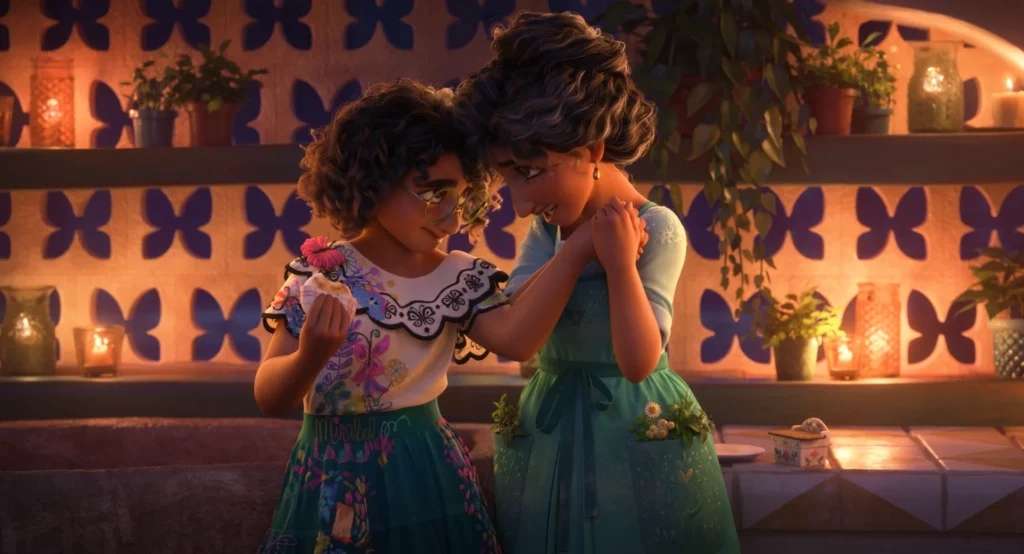
Julieta (and Agustín)
I wish there was more backstory for Julieta, Mirabel’s mom. Julieta is gifted with the power of healing the community with the food she has prepared—and it’s a gift that she’s often shown putting to good use! At first, it’s difficult to pinpoint any real burdens her gift may have bestowed, but then I think about how much time and effort Julieta must need to devote to the town to heal every injury. In imagining this, I can start to understand how her daughters—Isabela, Luisa, and Mirabel—may have picked up a few unhealthy behaviors from their selfless mother.
Surely, no one appreciates Julieta’s gift more than her clumsy husband, Agustín. Agustín brings a very grounded perspective to the Madrigal family, as he’s still very in-touch with the mundane, normal world. I’m still not sure which of her parents Mirabel takes after most.
Isabela
“Señorita Perfecta Isabela” is the oldest grandchild, Mirabel’s oldest sister, and the darling of the family. Given the power to grow beautiful flowers, Isabela has over the years been led to believe (by Abuela, her family, and the town) that her gift was perfection. The onus of being perfect is a component golden child syndrome (a line in the opening song even calls Isabela the “perfect golden child”). Isabela hid her true thoughts and desires, feeling obligated to carry herself in a way that matched everyone’s image of her (perhaps this sounds familiar in our social media loving world, no?). Mirabel, unaware of the sacrifices Isabela had made for the family, struggled to see her as anything more than a selfish entitled princess.
In trying to conform to their mold, Isabela limited her powers, believing she was only capable of growing beautiful flowers. However, when a cactus emerges in a moment of escaping emotions, Isabela realizes she’s capable of so much more. Isa embraces her new growth mindset (pun intended?).
Isabela has started a journey of self-discovery but given how she cowers when confronted by an angry Abuela, it’s clear it will take her time to break the family’s deep-rooted influence.
More About Isabela
Diane Guerrero Reveals How She Relates To Encanto’s Isabela – Exclusive (looper.com)
Dolores
Dolores, the second oldest grandchild, lives in Isabela’s shadow. With her gift of enhanced hearing, she carries the weight of the family’s secrets, but it seems she rarely feels heard. Sensitive to sound, Dolores speaks quietly, at a near whisper. She perhaps even has trouble speaking up for herself, quietly watching as the man of her dreams proposes to Isabela.
Luisa
Luisa is the second-oldest sister in Mirabel’s family. Gifted with super strength, we learn that Luisa is actually quite vulnerable. Bending to serve the family’s (and town’s) unending demands and anticipating each of their absurd requests (re-routing the river, re-pointing the toppling house, excavating and relocating the church, etc.), Luisa struggles to manage the “crushing weight of expectations.” She is afraid of letting everyone down (a fear she shares with, or possibly inherited from, her Abuela). She makes a few attempts to set boundaries, but quickly slips back into the role of the unbreakable one, associating her own self-worth with her ability to be strong for the community. “I’m pretty sure I’m worthless if I can’t be of service,” she tells Mirabel.
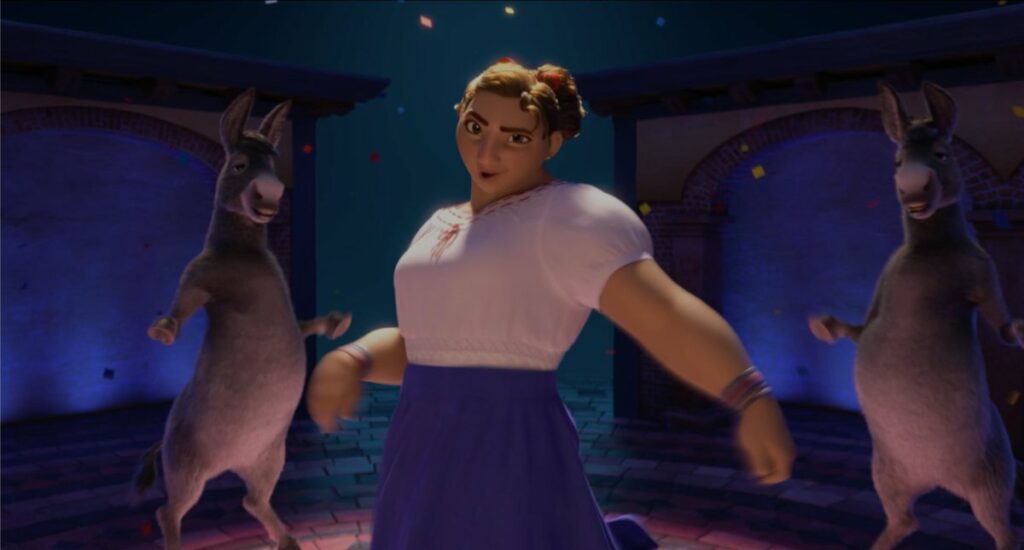
Luisa’s story is an important reminder that we need to check in with one another, even the toughest among us—in fact, perhaps especially the ones who appear to have it all together, because (little life spoiler here): they don’t.
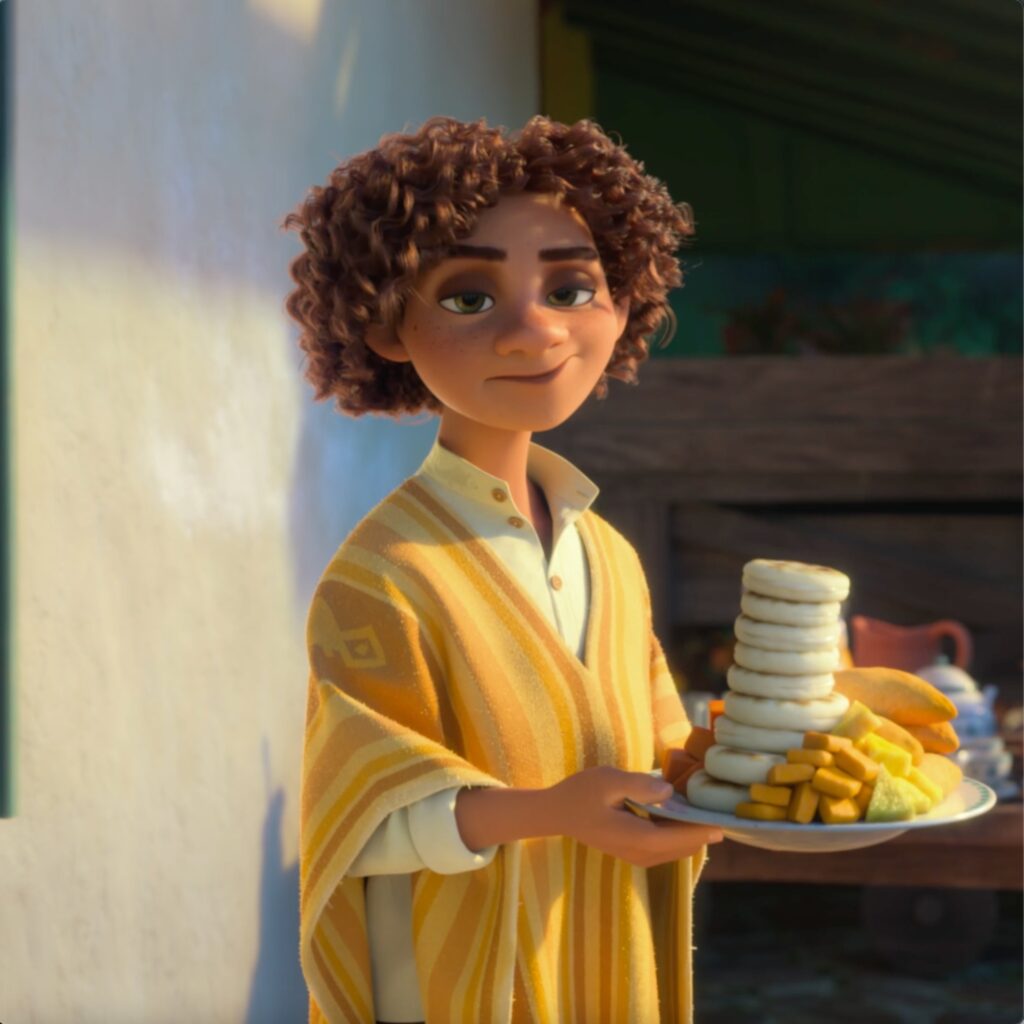
Camilo
Mirabel’s cousin Camilo is a sweet and playful member of the household and perhaps the only member of the family who is more-or-less loved for who they are, regardless of how they appear. That said, it seems Camilo, who was gifted with the power to shape-shift, is navigating his own identity crisis. Camilo had a minor part, but there’s much more to explore behind his many faces!
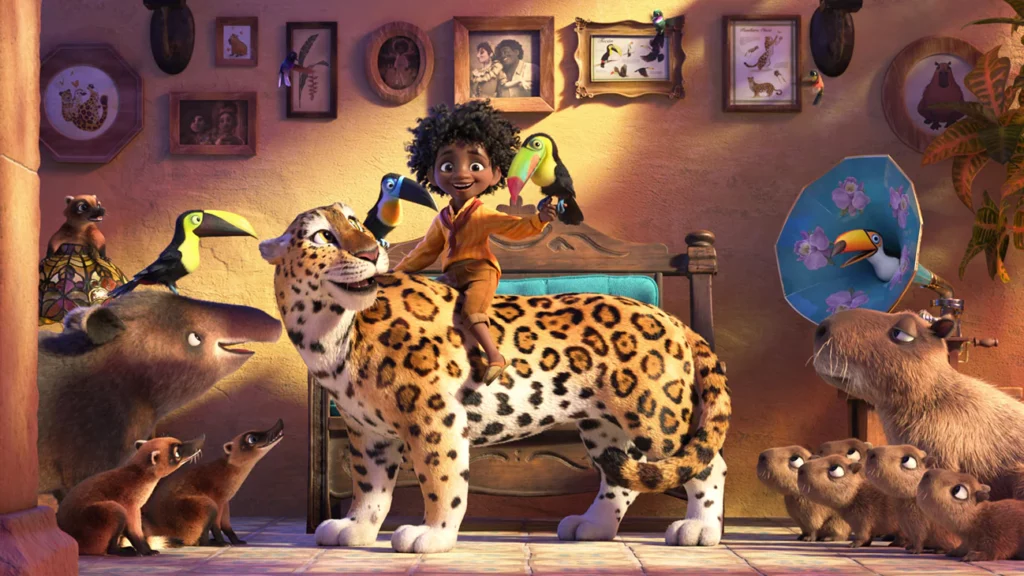
Antonio
Little toñito’s gift is brand-spankin’ new, yet we can already see how it threatens to take hold of him. After learning that he can commune with animals, one of Antonio’s first attempts to use his new gift is to request that a trio of coatis keep Abuela’s seat warm. While this seems like a thoughtful way for a young child to employ such a gift, Abuela views things differently, stating, “I’m sure today we’ll find a way to put your blessings to good use.” Clearly, the family (or at least Abuela) intends to influence Antonio’s understanding of his gift, mirroring some of Isabela’s experience. As this suggests, rather than being given the chance to discover our own gifts, we’re often shaped by others who tell us who we are supposed to be. We later see how Antonio’s gift nearly killed him—quite literally, when he was almost crushed by his own door as Casita began to crumble (only to be pulled out of the way at the last minute by his dad, Félix).
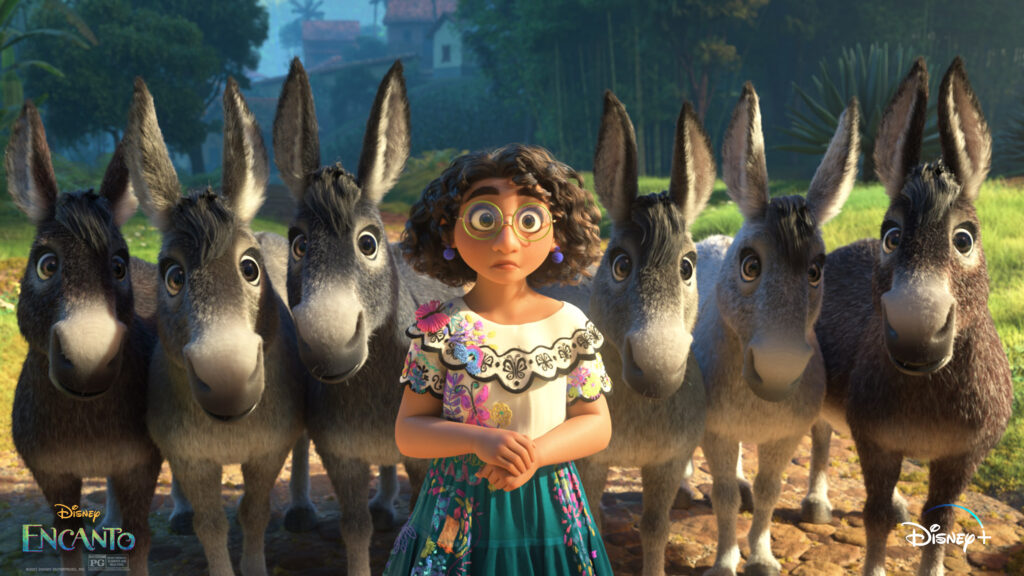
Mirabel
And then there’s Mirabel, the youngest child of Julieta and Agustín. Mirabel has no gift, per se, but she is an extremely empathetic individual with high emotional intelligence. On the night when she was meant to receive her blessing, the doorway which should have led Mirabel to her gift and future room vanished before her eyes. Actually, I read this as a metaphor for Mirabel’s true gift, since she (gently) breaks down any door that obscures her family members. The chorus of the film’s song “Dos Oruguitas” [English version] exclaims, “wonders surround you, just let the walls come down.” If not for Mirabel’s abilities, those wonders would remain undiscovered behind the walls of the Casita.
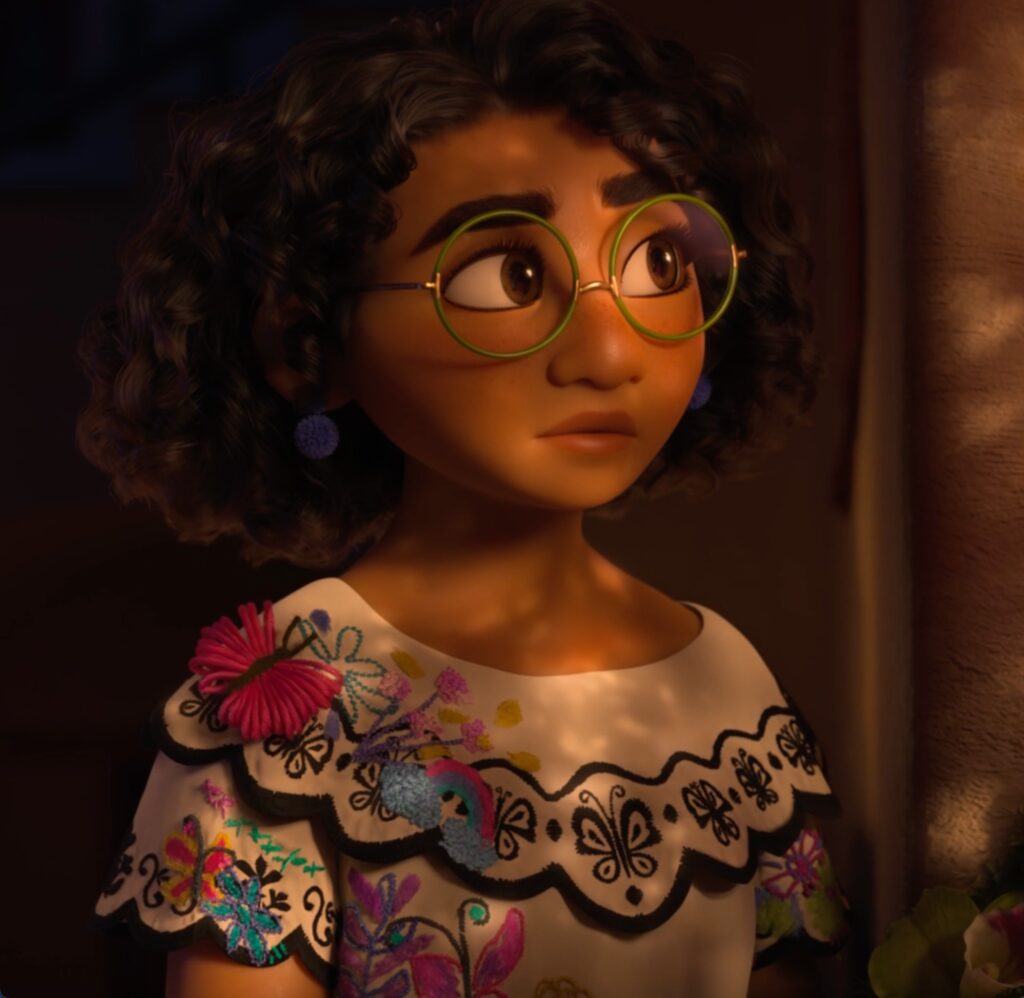
Speaking of wonders, it’s interesting to point out that the name Mirabel means “wondrous.” Clearly, in her own right, Mirabel is extraordinary. Mirabel is a resilient young woman. Despite a decade of being viewed as “less than”, she retained her confidence—proud to be a part of the magical Madrigals. “Gift or no gift,” Mirabel affirmed, “I’m just as special as the rest of my family.”
Mirabel had felt nothing but an absolute adoration toward her family, a level of respect that, tragically, was not reciprocated at first. Now, if we burrow a little deeper down the name rabbit whole, we might consider how mom calls her “Mira,” the Spanish word for “look.” Throughout the film, Mirabel just wants to be seen. In the song “Waiting on a Miracle” (this is Encanto’s “I Want” song, which is practically required for every Disney movie), Mirabel begs Abuela, “open your eyes!” In a storybook twist, this young girl in green glasses (a clever detail), who wants desperately to be seen herself, is the only one who gets beyond her family members’ walls and sees her relatives for who they truly are, and helps them see themselves. As the story ends, her family returns the favor. They encourage Mirabel to look inward, at which point it becomes abundantly clear: we’re not blessed with a gift, WE are the gift.
Perhaps our world would have a little more magic in it if we all began to see one another the way the Madrigals do at the end of Encanto. In the closing song, the entire Madrigal family serenades Mirabel,
We see how bright you burn
We see how brave you’ve been
Now, see yourself in turn
You’re the real gift, kid, let us in.Open your eyes.
Abre los ojos.
What do you see?
To which Mirabel responds,
I see me.
All of me.

